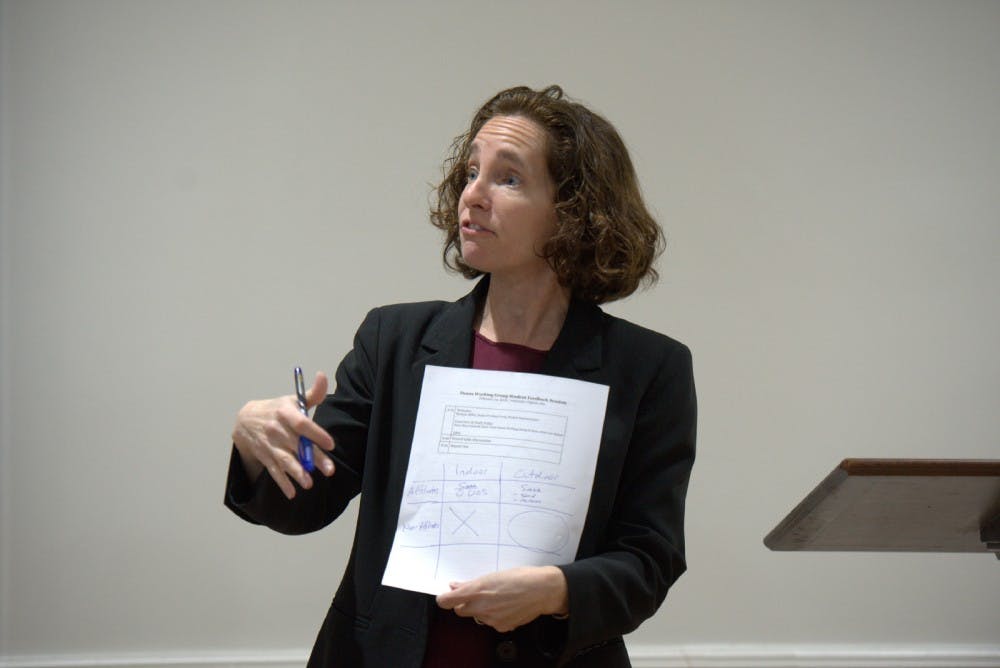More than six months after the events related to the “Unite the Right” rally in Charlottesville, the University community is still formulating responses and adjusting policies to discourage such activity from occurring on Grounds. The Board of Visitors has implemented several positive amendments to University policy, such as banning open flames on the Lawn in order to discourage white supremacist groups from holding torches while marching. However, others are not as constructive. These include re-evaluations of the climate of speech at the University, such as Student Council President Sarah Kenny’s column discussing hate speech at universities. She argued that “a select category of speech presently protected by a persuasive liberty paradigm fails to further the truth seeking charge of our scholars and institution of higher education.” On Feb. 14, Law School Dean Risa Goluboff led a Deans Working Group session soliciting input from the community concerning proposed regulations of speech of those not affiliated with the University and the legal boundaries of free speech.
The sentiments behind the proposed regulations outlined in the Use of University Facilities, Property, and Limits on Direct Solicitation and Advertising policy document, should alarm the University community. While Kenny’s and Goluboff’s proposals are well-intentioned, they both represent concerning trends towards the erosion of free speech and open discourse at colleges and universities across the country and should be condemned by University students, alumni, professors and administration — as well as Virginia lawmakers.
According to the most recent draft of the proposal, “The University of Virginia is a community in which the ideals of freedom of inquiry, thought, and expression are respected and sustained.” Outsider watchdog groups like the Foundation for Individual Rights in Education corroborate that claim, with FIRE giving the University its highest rating in the areas of free speech as well as other rights in education. Such freedom is one of the pillars that contributes to the University’s rich intellectual environment and distinguishes it from other universities like Harvard — where Goluboff earned her undergraduate degree and where President-Elect James Ryan currently works — which earned FIRE’s lowest rating concerning its free speech code.
However, the proposal would erode the University’s climate of open discourse and set a dangerous precedent for the regulation of speech at public universities were it to be implemented. According to its current wording, “Persons [unaffiliated with the University] wishing to utilize the spaces designated for public speaking or distribution of literature may do so by contacting the Office of the Dean of Students, Event Planning Services at least 7 days in advance of the desired speaking date … Reservations are for two-hour blocks, with a maximum of one two-hour block per speaker per week.” While many of the proposals outlined in the draft do not impose undue restrictions on speech, especially for individuals affiliated with the University, its goal of restricting the speech rights of those not affiliated undermines the public mission of the University. As written, an unaffiliated individual or group is only free to speak at the University — a taxpayer supported institution bound to uphold Constitutional protections — once per week for two hours after receiving approval from the Office of the Dean of Students.
The implementation of this proposal would reduce the inalienable rights of free expression to an appointment to be agreed upon at a convenient date. Speech should not have to wait for approval, nor should it be limited by time. As long as taxpayer funds support the University and its operations, its administration should not implement any regulation that places undue burdens on speech — such as those outlined in this draft.
The new policy aims to undermine the efforts of the extremist individuals who targeted Charlottesville and the University community this summer. However, limiting offensive speech is not the best way to counteract it. The best way to undermine those efforts is more speech. The same protections that allow radicals belonging to groups like the Ku Klux Klan to spread their hate allow others to dismantle their prejudice for what it is — malicious ignorance that has no place in Charlottesville or anywhere else. The violent clashes between the “Unite the Right” and other agitators exhibited the costs of free speech. While local authorities did not protect the safety of the Charlottesville residents when they allowed the demonstrations to turn violent, these events should not encourage University leadership to limit speech — but instead inspire them to address the safety concerns associated with such activity.
Thomas Jefferson’s University finds itself in a unique position to show either rational leadership grounded in principles of the Enlightenment, or regressive responses that appease misguided activist agendas. The University must not allow the fear of individuals such as white supremacists Richard Spencer and Jason Kessler to compromise its values. The University — as a public institution — is held to a higher standard of maintaining Constitutional freedoms. While private colleges and universities like Harvard have more freedom in restricting individual liberties in education, institutions that receive public funds have a legal and moral obligation to support and strengthen individual liberties.
Thomas Ferguson is an Opinion columnist at The Cavalier Daily. He can be reached at opinion@cavalierdaily.com.








